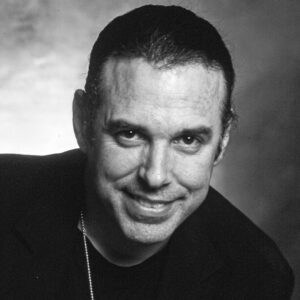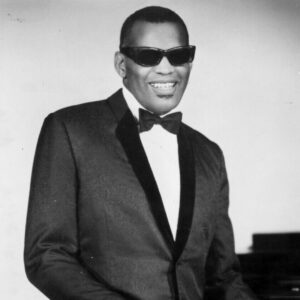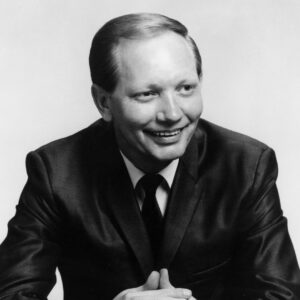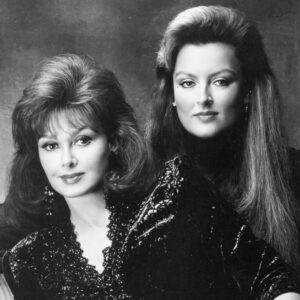

Hall of Fame Members
Class of 2021


Eddie Bayers
Recording and/or Touring Musician
Since the late 1980s, Eddie Bayers has been one of Nashville’s most in-demand studio drummers and is the first inducted into the Country Music Hall of Fame.

Ray Charles
Veterans Era Artist
Widely recognized as the “Genius of Soul,” Ray Charles also occupies a powerful place in country music history. He made country songs a significant part of his repertoire from the 1960s onward.

Pete Drake
Recording and/or Touring Musician
Pedal steel guitarist Pete Drake left a lasting mark not only on country music, but also on rock, gospel, and folk music. He is the first steel guitarist inducted into the Country Music Hall of Fame.

The Judds
Modern Era Artist
Naomi and Wynonna Judd helped take country back to its roots with lean, tuneful songs influenced by traditional folk music, acoustic blues, and family harmony acts.
Eddie Bayers, Ray Charles, Pete Drake, and the Judds inducted into the Country Music Hall of Fame
Five distinguished artists—two prominent musicians, a platinum-selling mother-daughter duo, and one of the most iconic musical artists in American history—were welcomed into the Country Music Hall of Fame in an emotional, star-studded Medallion Ceremony on Sunday, May 1, at the museum’s CMA Theater.
Eddie Bayers, Ray Charles, Pete Drake, and the Judds officially joined the Country Music Hall of Fame in an evening filled with once-in-a-lifetime musical performances and heartfelt, and at times tearful, testimonials in a two-and-a-half-hour ceremony.
The death of Naomi Judd on the eve of the Medallion Ceremony gave the event a muted sense of mourning, tender reflection, and open-hearted fellowship. “Her daughters asked that we go on with this ceremony, and we will, with no small amount of heartbreak,” said Kyle Young, CEO of the Country Music Hall of Fame and Museum, said of Wynonna and Ashley Judd, who sat in the front row. “In the wake of a loss, it’s difficult to celebrate, but we will try, with the Judd family’s urging and approval.”
Sarah Trahern, CEO of the Country Music Association, referenced a song co-written by Naomi Judd when offering condolences to the Judd family. “Love doesn’t just build a bridge,” she said. “It is the bridge. The Judds taught us that, and love is Naomi’s enduring legacy.”
Medallion Ceremony
Considered country music’s most prestigious event, the Medallion Ceremony celebrates the moment when inductees officially become members of the Country Music Hall of Fame. The ceremony accentuates the special talents and achievements that have made each new member deserving of country music’s highest honor.
Produced by the Country Music Hall of Fame and Museum, the program includes emotional speeches, musical tributes, and video biographies created by museum staff. The videos feature rare recorded performances, televised interviews, and historic photos culled from materials collected, stored, and digitized in the museum’s Frist Library and Archive.
The evening’s carefully curated performers are kept secret from the inductees and the audience until they are introduced onstage. Those presenting musical highlights from the inductees’ careers included Country Music Hall of Fame members Garth Brooks and Vince Gill. They were joined by Elizabeth Cook, Bettye LaVette, Wendy Moten, Carly Pearce, Tommy Sims, Trisha Yearwood, and the duos the War and Treaty (Michael Trotter Jr. and Tanya Blount Trotter) and Gillian Welch and David Rawlings. Country Music Hall of Fame member Marty Stuart led the audience in the ceremonial closing song, “Will the Circle Be Unbroken.”
Following longstanding custom, a member of the Country Music Hall of Fame, chosen by the inductee, welcomed each new member. For the class of 2021—whose official induction was delayed due to the pandemic—Charlie McCoy inducted Drake, Gill inducted Bayers, Ricky Skaggs inducted the Judds, and Ronnie Milsap inducted Charles.
In addition to Brooks, Gill, McCoy, Milsap, Skaggs, and Stuart, the Hall of Fame members in attendance included Duane Allen of the Oak Ridge Boys, Bill Anderson, Bobby Braddock, Teddy Gentry and Randy Owen of Alabama, Don Schlitz, Ray Stevens, Randy Travis, and Bud Wendell.
The audience observed a moment of silence in memory of the Hall of Fame members who died since the last Medallion Ceremony: radio and television personality Ralph Emery, pianist Hargus “Pig” Robbins, and member-elect Naomi Judd.
The Medallion All-Star Band, led by musical director Biff Watson on acoustic guitar, included keyboardist Jen Gunderman, harmony singers Tania Hancheroff and Wendy Moten, bassist Rachel Loy, electric guitarist Brent Mason, drummer Jerry Pentecost, fiddler and mandolinist Deanie Richardson, acoustic guitarist Jeff White, and pedal steel player Tommy White.
Pete Drake
Pete Drake achieved greatness as a pedal steel guitar innovator who elevated classic recordings by Ray Charles, Bob Dylan, George Harrison, George Jones, Charlie Rich, Ringo Starr, Tammy Wynette, and many others. Drake helped restore the steel to popularity after it fell from favor in the late 1950s and early ’60s.
A native of Augusta, Georgia, Drake moved to Nashville in 1959 and, after working on the road with Don Gibson and Marty Robbins, became a first-call pedal steel guitarist in Nashville studio sessions after his first recording date with singer Roy Drusky.
Drake also invented the “Talking Music Actuator,” also known as a “talk box,” which allowed him to use his voice to augment the sound of his instrument. Other musicians later adopted the instrument, and it was heard on hits by rock musicians Peter Frampton (on the hit “Show Me the Way”) and Joe Walsh (on the hit “Rocky Mountain Way”). Drake also made his mark as a producer, a song publisher, and a record label owner.
“Pete never diverted attention from the singer or the song, but never faded into the background,” Young said. “His playing was both distinctive and expansive.”
Musical tributes to Drake began with Americana artist Elizabeth Cook bringing personal flair to “I’ll Be Your Baby Tonight,” a song by Bob Dylan from his 1967 album, John Wesley Harding, which was recorded in Nashville and was the first Dylan album to include pedal steel guitar. Tommy White, from the Medallion All-Star Band, played Drake’s steel guitar part as Cook performed.
Singer Wendy Moten took on the challenge of “He Stopped Loving Her Today,” the George Jones classic that showcased Drake using the pedal steel as a counterpoint to Jones’s vocals. Moten’s dusky, full-throated version brought the first of the evening’s many standing ovations.
Inducting Drake, Charlie McCoy stressed the importance of studio musicians to Nashville’s recording industry success, and how they make their important contributions without the fame afforded to the artists whom they support. “The singer and the song are the picture,” McCoy said, quoting the longtime studio musician and Country Music Hall of Fame member Harold Bradley. “We are the frame. Our job is to frame the picture, not to distract from it.”
Drake developed an identifiable sound on pedal steel guitar, something all studio musicians strive to attain, but only a few do, “Everything he played fit like a glove, with so much feeling,” McCoy continued. “It was incredible, and he knew it was right.”
Rose Drake, the Hall of Fame inductee’s widow, said Nashville’s top studio musicians deserve more recognition. “The musicians of the ’60s, ’70s, and ’80s created Nashville as Music City,” she said. “We can’t let that get away.”
Eddie Bayers
Maryland native Eddie Bayers overcame a difficult early life to become one of Nashville’s most sought-after drummers. His absentee father, a war veteran, suffered from PTSD. His mother and sister were killed in an auto accident when Bayers was sixteen. Turning to music, Bayers ventured to the East Coast and then west as a pianist and drummer, finding work in Las Vegas and Los Angeles. He moved to Nashville in 1973, and renowned drummer Larrie Londin encouraged Bayers to seek work as a drummer in recording sessions. By the 1980s, Bayers played on albums by future Hall of Fame members the Judds, Reba McEntire, Dolly Parton, and George Strait. Bayers has been the Grand Ole Opry staff drummer since 2003.
Gill opened the musical tribute to Bayers by performing “When I Call Your Name,” a 1990 hit that he said required a sensitive, nuanced drummer. Gill joked that, during the song’s recording session, Bayers remarked that the tempo was so slow “that he had to count it off with a calendar.” Trisha Yearwood followed with a powerful reading of her 1992 hit, “Walkaway Joe,” to which Bayers had contributed hand percussion.
In welcoming Bayers to the Hall of Fame, Gill mentioned their nearly forty-year friendship. “A great drummer is felt, not heard,” he added, describing recording as a democratic process where everyone participates equally.
Bayers accepted the honor by thanking the “Father, Son, and Holy Spirit” and said he brought with him his “sacrament,” his wife, singer-songwriter Lane Brody. He noted that Naomi Judd gave his late son the nickname of “Chosen,” which now is chiseled into his tombstone. He thanked all the producers and musicians who hired him, saying he would name them all, but they number in the thousands.
The Judds
Ashland, Kentucky, natives the Judds overcame poverty and repeated setbacks in life to rise to worldwide fame, thanks to the perseverance of Naomi Judd and her recognition of daughter Wynonna’s remarkable voice. That perseverance landed the duo a recording contract with Curb/RCA Records in 1983. “They joined voices, and they joined forces,” Young said. “They sang in harmony even when they didn’t live in harmony.”
From the start, producer Brent Maher and guitarist Don Potter accentuated the simple, unadorned beauty of Wynonna’s husky voice and the subtle harmonies of Naomi, leading to twenty Top Ten hits, included fourteen #1s, in six years. “We can’t ever know all of their struggles,” Young said, “but we know all of their songs.”
The musical tributes to the Judds included CMA and ACM Female Vocalist of the Year Carly Pearce on a powerful version of “Grandpa (Tell Me ’Bout the Good Old Days),” and the duo Gillian Welch and David Rawlings on an understated and commanding take on “Young Love.”
Skaggs, in welcoming the Judds to the Hall of Fame, spoke from the heart about his friends and fellow Kentuckians, Naomi and Wynonna Judd. He first met the two when they came backstage at a San Francisco concert in 1978, when Wynonna was in her early teens. Skaggs described the music the duo developed with Maher and Potter as “an acoustic sound so solid that it cut through everything. There was no question that you were country, rootsy, Kentucky.”
Ashley Judd joined her sister Wynonna at the podium to accept the Hall of Fame honor. “My mama loved you so much,” she said to all present. “She appreciated your love for her, and I’m sorry she couldn’t hang on until today. Your esteem for her, and your regard for her, really penetrated her heart. It was your affection for her that kept her going in these last years.”
Speaking to Wynonna, Ashley said, “While this is so much about the Judds as a duo, I want to recognize my sister.” Using a popular term, she called her sister “a GOAT,” an acronym for “greatest of all time.”
Wynonna didn’t prepare a speech, she said, “because I knew Mom would probably talk the most,” drawing laughs of recognition from the audience. “It’s a strange dynamic,” she added, “to be this broken and this blessed.” With Ashley, Wynonna recited Psalm 23 (“The Lord is my shepherd”), which she said the family had intoned together at Naomi’s bedside as she passed away the previous day.
After the speeches, songwriter and performer Tommy Sims brought tears to many in the crowd by presenting a slowed down, thoughtful reading of “Love Can Build a Bridge,” a song written by Naomi Judd, John Jarvis, and Paul Overstreet.
Ray Charles
Ray Charles faced dreadful difficulties as a child: at age five, he watched as his brother drowned; at age seven, he became a ward of a segregated school for blind children 150 miles from his home; at fifteen, he became an orphan. Still, he ultimately triumphed, maturing into a revered musical explorer and “musical superhero,” as Young described him. “He created soul music, and he gave part of his soul to country music.”
Five years after his first hit in 1954, Charles recorded Hank Snow’s “Movin’ On,” his first cut from the country music repertoire. He underscored his love of country music with Modern Sounds in Country and Western Music, recorded in 1962 against the wishes of his record company. The album defied expectations by spending a month at the top of the pop album chart. Charles would return to country music throughout his career, including 1984’s Friendship, which featured duets with country music giants Johnny Cash, Merle Haggard, George Jones, and Willie Nelson.
The duo the War and Treaty—Michael and Tanya Trotter—emphasized Charles’s soul-gospel roots on their version of “You Don’t Know Me,” a #2 pop hit in 1962. Garth Brooks delivered, with storytelling skill and powerful dynamics, the complex narrative of “Seven Spanish Angels,” a #1 country hit for Charles and Willie Nelson. R&B great Bettye LaVette dramatically brought out the soulful pathos in “I Can’t Stop Loving You,” which spent five weeks at #1 for Charles in 1962.
Ronnie Milsap spoke of the importance of Ray Charles and the influence he had on him and on all popular music. He recalled meeting his hero in New York, at age twenty-two, during his first recording session, and how his own recording of “Let’s Go Get Stoned” inspired Charles to cut the same song. Over the decades, the two wrote braille letters to each other, and they both dedicated themselves to promoting braille literacy.
“Everybody tries to mimic Ray Charles,” Milsap said. “You can’t do it. There was only one of him—and only one.” He added, “Ray would be so happy today to be part of this celebration. He sang country music like it should be sung.”
Valerie Ervin, president of the Ray Charles Foundation, said that “country was something that he truly, truly loved, which was unheard of for an African-American in those days.” Emphasizing that Charles recorded thirty-three country songs from 1962 to 1966, Ervin said those recordings earned four Grammys and eight Top Forty hits, including six that reached the Top Ten. “Country music was the core of Ray Charles’s life,” she said. “His love and appreciation for the genre can never be overstated, and its influence helped shape his storytelling in other genres.”
Closing
The Medallion Ceremony’s traditional finale, a performance of “Will the Circle Be Unbroken,” was led by Marty Stuart and the Medallion All-Star Band, as the crowd sang along. The performance proved a fitting end to an emotional evening that emphasized connection, support, and the sense of a communal family that permeates the genre at its pinnacle.
